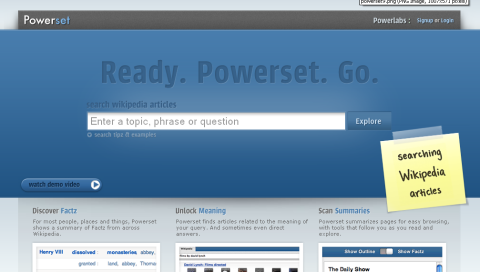Powerset's search: Does it deliver?

Powerset has rolled out its semantic search engine and has managed to get a ton of attention. The larger question for me: Does it deliver? And where does Powerset make the most sense?
Powerset on Monday introduced its natural language search for Wikipedia content (Techmeme). This effort is really a proof of concept--a strong one--to indicate what is possible if the Web were to go semantic. Powerset has raised $12.5 million in Series A funding and as Dan Farber notes will need more money if it's going to index the Web.
Also see: Paul Miller: Powerset shows semantic search solution
It is possible that Powerset will represent a big shift to semantic search but for those of us that just want results we're not there yet. In fact, Powerset's best application--assuming Microsoft doesn't buy it as Dan advocates--is within the corporate world. Powerset extracts phrases and adds context around it to deliver results. This could come in handy in a company looking for memos from three years ago about negotiations for a licensing deal that wasn't finalized.
The problem with any corporate focus for Powerset: Enterprise search players abound. And on the semantic Web side Sidearian already has some traction. But that's a discussion for another day. Keep in mind that comparing Powerset to something like Google isn't necessarily a fair fight since one indexes the Web and the other just Wikipedia. However, you do get a feel for things. Here's an overview (gallery):
First up, I was looking for information on the RIM-Apple war for the prosumer. A term that Wikipedia didn't carry much of. Thus far, Powerset looks like any other search:
Google nails it right away. But note that we're talking Wikipedia vs. the Web.
Next up, I was poking around for Bill Gates and Steve Jobs together. One item about semantic search may be user habits. I generally search on nouns out of habit. A semantic search could include Bill Gates stands next to Steve Jobs.
The Google result shows how it's critical for Powerset to index the Web. That means Powerset will need a lot more funding or be acquired, an outcome that would make a fine exit strategy.
Where Powerset comes in handy is big generic terms and items--the kind of information that's a Wikipedia specialty. My World War II search gives me a nice interface and key verbs that are relevant to my search on a high level.
And you can drill down on those terms. Here's a look at how PowerSet grabs verbs and assigns them meaning.
While Powerset is great for browsing I already know what I'm looking for--Italy's botched attack on Greece. Here's a look at the Powerset breakout on Greece in World War II. If this were a Web search I'd expect to find a lot more references. For instance, I'd expect some information on how Mussolini had to get bailed out by Hitler.
For comparison's sake I search on Google to find more information. Two Wikipedia entries lead the page. These items didn't surface on Powerset.
Bottom line: Powerset's interface is nice and the search could be applied to multiple markets. However, the benchmark remains Google. The average bear isn't going to ponder the semantic Web and its importance. We simpletons will want results. The real game for the semantic Web will be delivering those results.
Also: Life without Google
